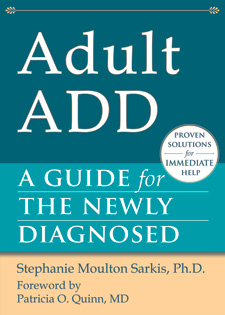Adult ADD – Newly Diagnosed
Foreword by Patricia O. Quinn, M.D.
You’ve just been diagnosed with ADD-now what?
After receiving a diagnosis of attention deficit disorder (ADD), you may feel relieved to finally have an explanation for your symptoms, but also concerned and full of questions about the future. Questions like: What are the best ways to get your symptoms under control? Should you tell people at work? And-wait a minute-there can be good things about having ADD?
In Adult ADD: A Guide for the Newly Diagnosed, an ADD specialist who has the disorder herself answers these questions and offers all the tools and information you need to process the diagnosis, learn about medications, and decide which treatments are the best options for you. This pocket guide also features a complete list of resources you can use to find support and tips for getting organized and living well with ADD.
“The first and most important thing the newly diagnosed can do is to educate themselves about ADHD. But where to begin? In a thoroughly accessible and practical way, Sarkis covers all the major topics. This is a great first book to read after being diagnosed with ADHD because it gives you the lay of the land and guides you toward the topics you may want to learn more about.”
“An important contribution for ADHD adults, this book is easy to read, with concise sections that allow readers to quickly grasp important information. This book is an excellent starting point for newly diagnosed adults with ADHD and family members hoping to understand the disorder.”
“If you’ve just been diagnosed with ADD, you need this book. It will guide you step by step through understanding the diagnosis and the best treatments for you. This book will help you find hope and figure out your next steps.”
“While there have been several good adult ADHD introductory books, Sarkis’ new guide provides updated value in a rapidly advancing field. In addition to explaining just what to do, she skillfully advises about how to work through the process, highlighting the importance of ongoing personal and professional helping relationships.”

